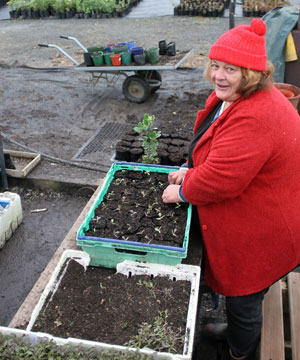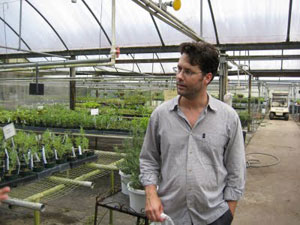Nursery Grower/Worker
Tasks & duties

Nursery growers/workers may do some or all of the following:
-
prepare soil mixes and composts
-
grow plants from seeds and various types of cuttings
-
manual tasks such as digging and shovelling
-
water, feed, prune, pot and label plants
-
make sure conditions in glasshouses suit the plants
-
operate and maintain irrigation systems
-
spray plants to control pests and diseases
-
operate specialised motorised mechanical equipment, including mechanical sowing, harvesting and potting machinery
-
remove, destroy and control weeds
-
assess the quality of plants
-
record information about plants
-
co-ordinate stock control and organise the dispatch of plants
-
sell plants in a garden centre
-
deliver plants
-
drive bobcats, forklifts and delivery trucks
Specialisations
Nursery growers/workers may specialise in growing or working with one type of plant, or growing plants organically.
Nurseries specialise in growing:
-
native plants for roadside and motorway plantings
-
large volumes of plants to sell to large garden centres or hardware chains
-
seedlings for use in city gardens, roundabouts and roadsides
-
fruit trees or berry bushes for sale to orchardists
-
plants to sell directly to the public (retail nurseries)
Some people working in nurseries may specialise in advertising and marketing, especially if they have previously worked in marketing.
Skills & knowledge

Nursery growers/workers need to have:
-
knowledge of how to grow and care for plants
-
knowledge of pest, weed and disease control
-
knowledge of plant and soil types and characteristics
-
observation skills
-
practical skills and the ability to diagnose and solve problems
-
record-keeping skills and ability to use computerised systems of inventory control
-
maths skills
-
organisational skills
They may also need management skills (if in charge of staff).
Entry requirements
There are no specific entry requirements for becoming a nursery grower/worker, but employers prefer hard-working people with a keen attitude and an interest in plants.
Apprenticeships are offered by some employers in the nursery sector.NZ Horticulture Industry Training Organisation website – qualifications and apprenticeships
Secondary education
Three years of secondary education is required by most employers and some prefer to take people with Sixth Form Certificate or NCEA Level 2. Useful subjects include English, biology and horticulture.
Tertiary education
Some employers prefer a tertiary qualification in nursery production or horticulture, such as a National Certificate in Horticulture.
For management positions, a degree in horticulture is usually preferred, and it is useful to have qualifications in management or business studies.
Training on the job
Nursery growers and workers need to keep up to date with developments in the industry by attending garden shows and conferences, reading horticulture and seed magazines, and researching on the Internet.
Useful experience
Useful experience for nursery growers/workers includes work in gardens, orchards, farms and factories or driving. Management and business experience is also useful.
Temporary work is available in some nurseries during their busy times and is an excellent way of trying out the job. Busy times vary according to the type of nursery. The busiest time for:
-
retail nurseries is in spring and autumn, when customer sales are highest
-
commercial fruit nurseries is winter, when trees are grafted, lifted and graded
-
council supply nurseries is September to December, when plants are bagged
Related courses
Horticulture
For more information, please refer to Career Services.
Document Actions
